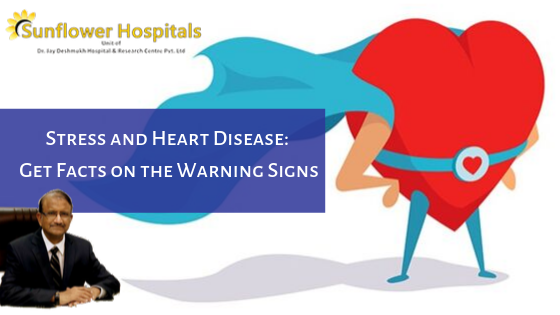Dr Jay Deshmukh :- Stress is an inevitable part of life. Everyone feels stress in different ways and reacts to it in different ways. How much stress you experience and how you react to it can lead to a wide variety of health problems and hence it is important to know what you can do about it.
Is stress itself a risk for heart disease?
- Dr Jay Deshmukh: – Recurring stress or long term stress can expose your body to unhealthy chemicals in your body. These chemicals are released in response to stress. These are stress-related hormones known as adrenaline and cortisol. Stress is also linked to the way the blood clots. This increases the risk of a heart attack.
What is a stress-induced heart attack?
- Dr Jay Deshmukh :- Stress cardiomyopathy is also referred to as broken heart syndrome is a condition in which intense emotional or physical stress can cause severe and acute weakness of heart muscle, also known as cardiomyopathy. This is also known as Takatsubo cardiomyopathy.
What are the other responses to stress?
- Dr Jay Deshmukh :- The other responses to stress include aches and pains, decreased energy and sleep. Feeling of constant anxiety, anger and depression. Impatience and forgetfulness are also common in individuals who have chronic stress. Palpitations, sweating of palms, unable to cope up with the workload, recurrent stomach upset, using drugs or alcohol to escape from realities of life are other important features.
How does stress affect your heart?
- Dr Jay Deshmukh :- Unmanaged stress, particularly anger and hostility can affect your heart. It may cause high blood pressure, irregular heart rhythms, damage to your arteries, high cholesterol levels, the development and progression of coronary artery disease and a weakened immune system. Individuals tend to smoke, drink alcohol in excess, have food in excess, gain weight and this itself leads to increased incidence of heart disease.
How can you gain control of your stress?
- Begin to take note of things that cause you to feel stressed. Accept the fact that you may not be able to change certain situations. Take time out each day to relax. Exercise every day. Take care of your body. Eat a healthy diet. Get enough sleep. Take time to praise your self for a job well done. Yoga and meditation always help. Be around with people who have a positive attitude. Reduce caffeine and have decaffeinated coffee or herbal tea. Individual counselling or group counselling helps.
Does crying affect your heart?
- Crying is not only a human response to sorrow and frustration, but it is also a healthy one. Crying is a natural way to reduce stress. Do not stop crying if you are under severe stress. Go ahead and open up your feelings. Crying is good for health.
What is type A coronary prone behaviour?
- Some individuals exhibit a certain characteristic activity pattern. These include self-imposed standards that are unrealistically ambitious. Certain thoughts and ideas that are characterised by persistent vigilance and impulsiveness. Unsatisfactory interpersonal relationships, irregular or unusual breathing patterns with frequent sightings are characteristic features. Type A individuals are more concerned with quantity than quality. They are usually in a hurry and consequently eat, walk, talk and do most other activities at a more rapid pace.
What are type B and C personality?
- Type B is a behaviour pattern characterised by a relaxed manner, patience and friendliness that possibly decreases one’s risk of heart disease. Type C is a psychological disposition where an individual seems quiet and thoughtful but in fact, is frustrated and angry. They lack emotions and are not assertive. Type C personalities or cancer-prone personalities have two consistent traits. The lack of expressing negative feelings and the need for harmony.
Stress is inevitable. Your response to stress determines the hazard of stress. Having a more relaxed and a bit less competitive attitude seems to be more useful these days. Cry as much , that is good for health. Always have a middle path. Remember type B personalities are the best. Be B and keep A and C for the rest.
Author: Dr Jay Deshmukh
Dr Jay Deshmukh is Chief Physician and Director, Sunflower Hospital, Nagpur Honorary Physician to Honorable Governor of Maharashtra and PondicherryCentral. Dr Jay Deshmukh is an M.B.B.S., M.C.P.S., F.C.P.S., M.N.A.M.S., MD From Internal Medicine – Bombay and New Delhi.


